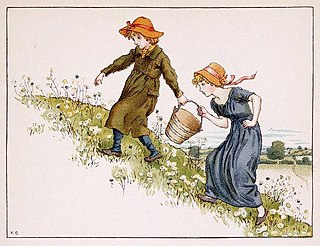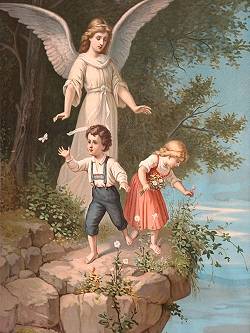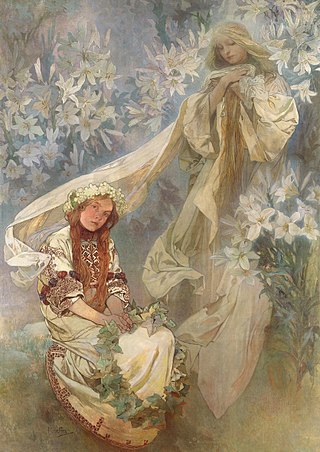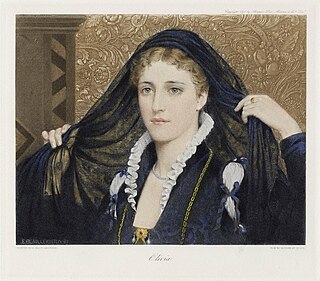Amy is an English feminine given name, the English version of the French Aimée, which means beloved. It was used as a diminutive of the Latin name Amata, a name derived from the passive participle of amare, “to love”. The name has been in use in the Anglosphere since the Middle Ages. It was among the 50 most popular names for girls in England between 1538 and 1700. It was popularized in the 19th century in the Anglosphere by a character in Sir Walter Scott's 1821 novel Kenilworth, which was based on the story of Amy Robsart. Enslaved Black women in the United States prior to the American Civil War were more likely to bear the name than white American women because slave masters often chose their names from literary sources. The name declined in use after 1880 but was revived due to the hit song Once in Love with Amy from the 1948 Broadway musical Where's Charley?. The name peaked in usage in the United States between 1973 and 1976, when it was among the five most popular names for American girls. It remained among the top 250 names for American girls in the early 2020s.
Polly is a given name, most often feminine, which originated as a variant of Molly. Polly may also be a short form of names such as Polina, Polona, Pauline, Paula or Paulina.

Jill is an English feminine given name, a short form of the name Gillian and Ghislaine, which in turn originated as a Middle English variant of Juliana. Jill was such a common name that it had an everygirl quality, as in the 15th century English nursery rhyme Jack and Jill. By the 17th century, the name had become a term for a "common street jade," implying promiscuous sexual behavior, and declined in usage in the Anglosphere. Usage of the name increased again in the 20th century. The name was most used in English-speaking countries from the 1930s to the 1970s. It is currently well-used in the Netherlands.
Teresa is a feminine given name.
Maggie is a common short form of the name Magdalena, Magnolia, Margaret, Marigold.

Samantha is a feminine given name.
Danny is a masculine given name. It is related and short to the male name Daniel. It may refer to:

Linda is a female given name, of German origin, but widespread in the English-speaking world since the end of the nineteenth century. The German name Linde was originally an abbreviated form of older names such as Dietlinde and Sieglinde. In the form Linda, it was used by the writer Jean Paul for a leading character in his four-volume novel Titan, published 1800–1803, and it became popular in German-speaking countries thereafter.
Karen is a given name and occasional surname. In English, it is a feminine given name derived from the name Katherine, and it is also found in modern Africa, as well as in East Asia. However, in other countries such as Iran and Armenia, it is a masculine name deriving from Middle Iranian.
Vivian is a given name, and less often a surname, derived from a Latin name of the Roman Empire period, masculine Vivianus and feminine Viviana, which survived into modern use because it is the name of two early Christian female martyrs as well as of a male saint and bishop.
Andy, also spelled Andi, Andie or Andee, is predominantly a diminutive version of the male given name Andrew, and variants of it such as Andreas and Andrei. The form of the variation is based on the Scottish "-ie" diminutive ending. Andrew is derived from the Greek name Andreas, meaning "manlike" or "brave". Andy is also occasionally used as a diminutive for the female given name Andrea.

Angela is a female given name. It is derived from the Greek word ángelos (ἄγγελος), meaning angel from Greek mythology. In the United States, the name "Angela" was at its most popular between 1965 and 1979, when it was ranked among the top 10 names for girls. Between 1922 and 2021, in the United States, the name was ranked in the top 35 names for girls.
Jenny was originally the diminutive form of Jane, but it is now associated with Jennifer.

Lily is a feminine given name usually derived from lily, the flower. The name became particularly popular along with other flower names for girls during the 1800s and early 1900s. The lily also has associations with and has been symbolic of innocence and purity in Christian art. Names beginning with or containing the letter L have also been particularly fashionable for girls. It is also occasionally used as a diminutive for other names such as Elizabeth.
Ellie, or Elly, is a given name, usually feminine. The name stands on its own or can be a shortened form of any of the numerous female names beginning with the syllable El-, in particular Eleanor, Elizabeth, or Elvira. It can also be a short form of Elaine, Elena, Michelle, Elnaz, Amelia, Elham, Elaheh, Eliana, Eloise, Emelia, Elisa, Ellisha, Elisha, Elesha, Shelly, Eleni, or Petronella and as a masculine name of Eleazer, Elliot, Elron, or Elston. In Greek mythology, Ellie (Helle) was the daughter of Athamas and Nephele; sister of Phrixus.

Stephanie is a female name that comes from the Greek name Στέφανος (Stephanos) meaning "crown, wreath, garland". The male form is Stephen. Forms of Stephanie in other languages include the German "Stefanie", the Italian, Czech, Polish, and Russian "Stefania", the Portuguese Estefânia, and the Spanish Estefanía. The form Stéphanie is from the French language, but Stephanie is now widely used both in English- and Spanish-speaking cultures.
The given name Lisa can be a short form of Elisabeth, Melissa or Elizabeth. In the United Kingdom, the name Lisa began to gain popularity during the 1960s, by 1974 it was the fifth most popular female name there, and a decade later it was the 14th most popular female name there. However, by 1996 it had fallen out of the top 100. Similarly, in the US it was the most popular female name for most of the 1960s and in the top 10 through most of the 1970s before falling.

Olivia is a feminine given name in the English language. It is derived from Latin oliva, olive. Both Oliva and Olivia were Latinate forms in use in English-speaking countries as early as the 13th century. Olive was in common use as a vernacular form. Though not invented by William Shakespeare, the name was popularized by a character in Twelfth Night.
Carol is a unisex given name in English, although in contemporary usage it is more commonly used for women. It is a variant of the English Charles, the German Carl, and the Latin Carolus. Spelling variations include Carole. People named Carol include:







